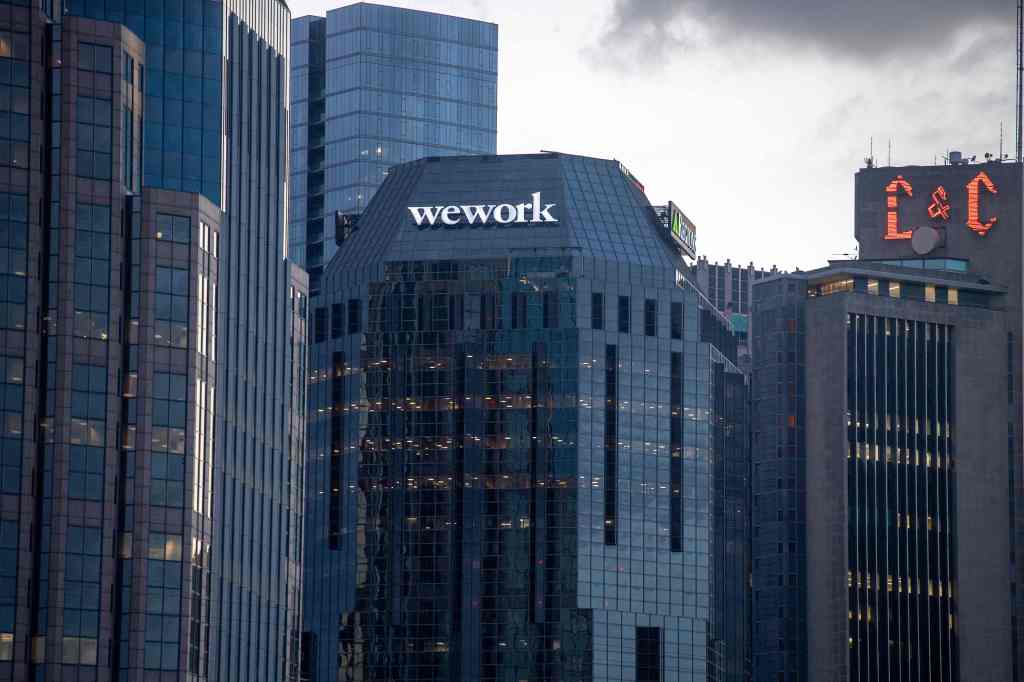Judge orders WeWork to cough up financial records related to broken lease at NYC skycraper
A New York judge has demanded that WeWork, which filed for bankruptcy this week, cough up “bank statements, canceled checks, wire transfers, records of deposits, withdrawal receipts and wire transfer receipts” it has allegedly safeguarded since 2010 in an allegedly deliberate move to breach a Manhattan lease.
The court order obtained by The Post threatens to crack open WeWork’s operations in a move that could see other landlords that feel cheated by the coworking giant filing suit — including with roughly 40 New York contracts Bloomberg reported WeWork intends to terminate following its bankruptcy filing.
The little-noticed ruling last month by New York Supreme Court Justice Joel Cohen comes years after real estate mogul Alex Sapir sued WeWork for violating the terms of its lease agreement at his 28-story tower at 261 Madison Ave.
In the 2021 lawsuit, which sought $17 million in damages, Sapir alleged that WeWork was playing a shell game that saw it claiming “inadequate capitalization, a commingling of assets, and the diversion of corporate funds” that left it falsely unable to pay its bills, per the court order.
Now, Judge Cohen apparently wants to see just how accurate Sapir’s argument is against WeWork, which sought US bankruptcy protection on Monday after a meteoric rise to a $47 billion valuation — and an equally meteoric fall.
At a ruling over the summer, Cohen said “The plaintiff [Sapir] has sufficiently pleaded facts that, if true, would support, or could support, piercing the corporate veil,” The Real Deal reported at the time.
However, even if Sapir secures a judgment in his favor, his real estate development firm The Sapir Organization could find itself at the back of a very long line of creditors after WeWork initiated Chapter 11 proceedings.
“We are pleased the court saw through WeWork’s transparent attempt to insulate themselves from the piercing disclosures that we expect will further establish what our filings have alleged, that the WeWork entities freely commingled funds among each other to avoid their contractual obligations,” said Sapir’s counsel at Oved & Oved LLP, Terrence Oved, and Darren Oved.
“Rest assured, bankruptcy court will not be a place of refuge for them as we will continue pursuing WeWork and Neumann until our client has recovered everything to which it is entitled.”
In the best-case scenario for Sapir — the son of the late billionaire Tamir Sapir — the documents from WeWork will substantiate his claims that WeWork has not operated as a legitimate company, but instead as a “shell entity [that] was undercapitalized with the intent of avoiding obligations,” the court documents claimed.
Sapir, who claimed WeWork violated the terms of its lease agreement at his 28-story NYC tower, also alleged that WeWork played a shell game that saw it claiming “inadequate capitalization, a commingling of assets and the diversion of corporate funds” that left it falsely unable to pay its bills, per the court order.
All the while, the once high-flying startup seemingly had money. At its height, WeWork boasted a $47 billion valuation and its billionaire co-founder and CEO Adam Neumann — who was ousted as chief in 2019 over reports about his outlandish behavior — was hosting lavish, booze-soaked affairs and reportedly bringing wads of marijuana on his private jet trips.
Representatives for WeWork did not immediately respond to The Post’s request for comment.
WeWork has exited a slew of leases across the country in recent years, and as of Monday intends to terminate roughly 70 leases in New York alone — including 40 contracts at a space near Union Square and in Fulton Center.
WeWork has already stopped operating in and moved out of most of the co-working spaces it hoped to exit upon its bankruptcy filing, Bloomberg reported, though it wasn’t immediately clear if the move-outs happened before or after the company expressed “substantial doubt” about its continued operation in August.
According to WeWork’s website, it still has 47 open co-working locations across New York.
In 2021, WeWork abandoned its lease at CIM Group’s Hollywood office complex, where it was renting three-quarters of CIM’s more than 100,000 square feet, according to The Real Deal.
The outlet said WeWork also ditched two floors at 25 West 45th St. in Midtown Manhattan. And in 2022, WeWork also bailed on a lease for 112,000 square feet of space in a building in the Chicago Loop, per The Real Deal.
As of 2022, WeWork had a reported 79 locations across 39 countries, though it now boasts just 660 flexible workspaces, per WeWork’s website.
Just last month, WeWork also found itself in another high-stakes showdown with big landlord DivcoWest, which is seeking a whopping $20 million in a lawsuit filed in Manhattan alleging WeWork breached its lease at the San Francisco-based real estate titan’s 311 W. 43rd St. location.
The opening salvo in this legal fracas came when WeWork failed to pony up its December rent, pushing DivcoWest to swiftly terminate the lease. However, Divco contends that WeWork still owes rent for the entire duration of the original agreement — stretching all the way to 2032.
WeWork fired back, claiming it had vacated the premises. However, DivcoWest asserts that the tenant never provided formal notice of its departure. Moreover, WeWork’s failure to remove its property from the space doesn’t align with the actions of a company surrendering its lease, as argued by DivcoWest in its lawsuit.
During that time, real estate veteran Sandeep Mathrani headed WeWork after Neumann was pushed out, and SoftBank — the Japanese technology group that owns about 60% of WeWork and has invested billions of dollars in its turnaround — needed a chief executive to turn the company around.
However, Mathrani stepped down in May, followed by the exit of CFO Andre Fernandez in the same month.







